Training and Assessment: Disability Support, Skills Development
VerifiedAdded on 2023/01/19
|14
|4337
|82
Homework Assignment
AI Summary
This assignment solution covers key aspects of training and assessment in the context of disability support. It includes two assessments: the first addresses the definition of social disability, person-centered practice, national standards for disability services, assessment tools for skill development, communication techniques, and learning strategies. The second assessment focuses on ongoing skills development needs for clients, information gathering methods, involvement of other staff, and the importance of feedback to supervisors. The solution provides examples and explanations relevant to healthcare practitioners, particularly within the NHS framework, emphasizing the importance of individualized care, documentation, and progress monitoring to enhance learning opportunities for individuals with disabilities. Desklib offers a wealth of similar assignments and study resources for students.
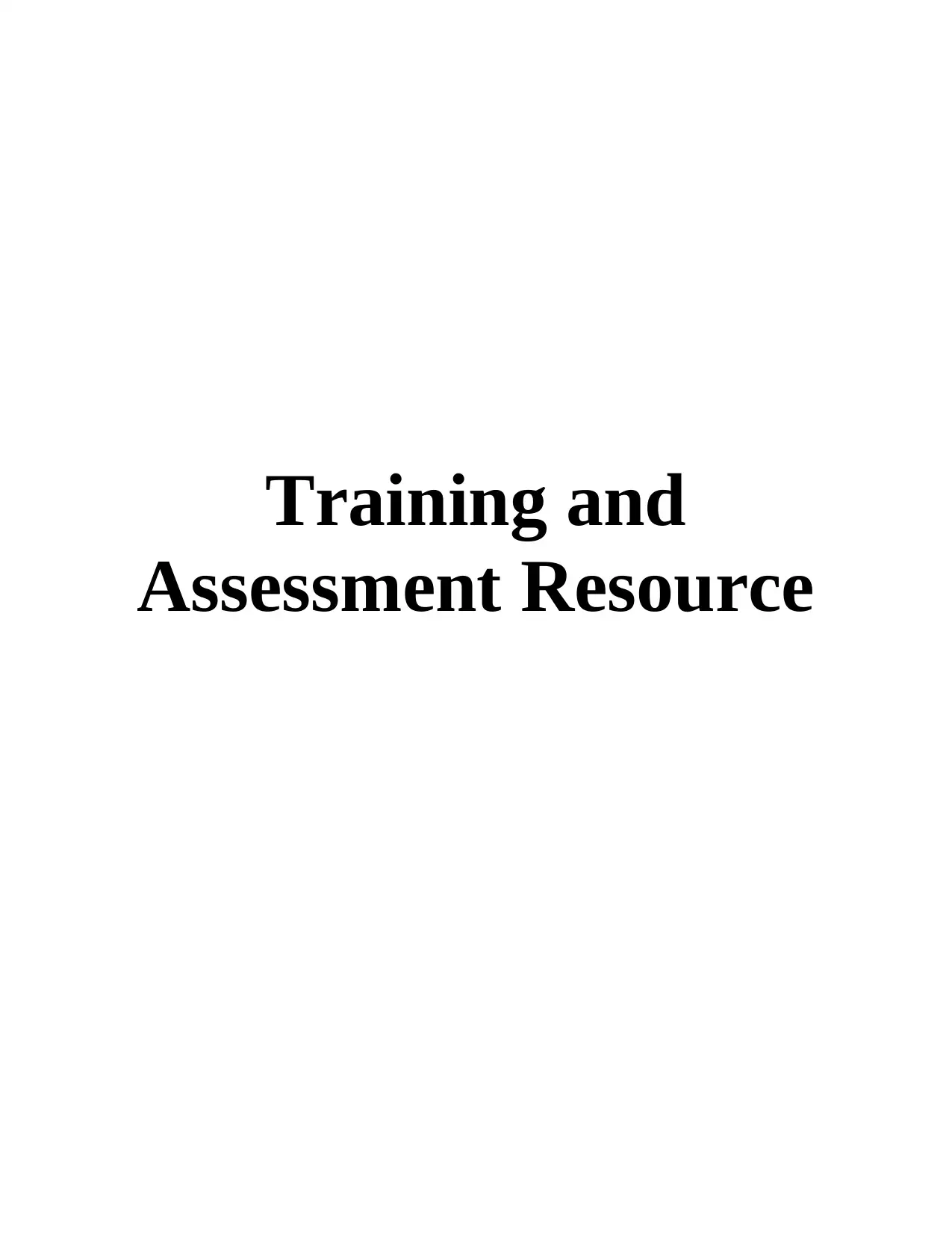
Training and
Assessment Resource
Assessment Resource
Paraphrase This Document
Need a fresh take? Get an instant paraphrase of this document with our AI Paraphraser
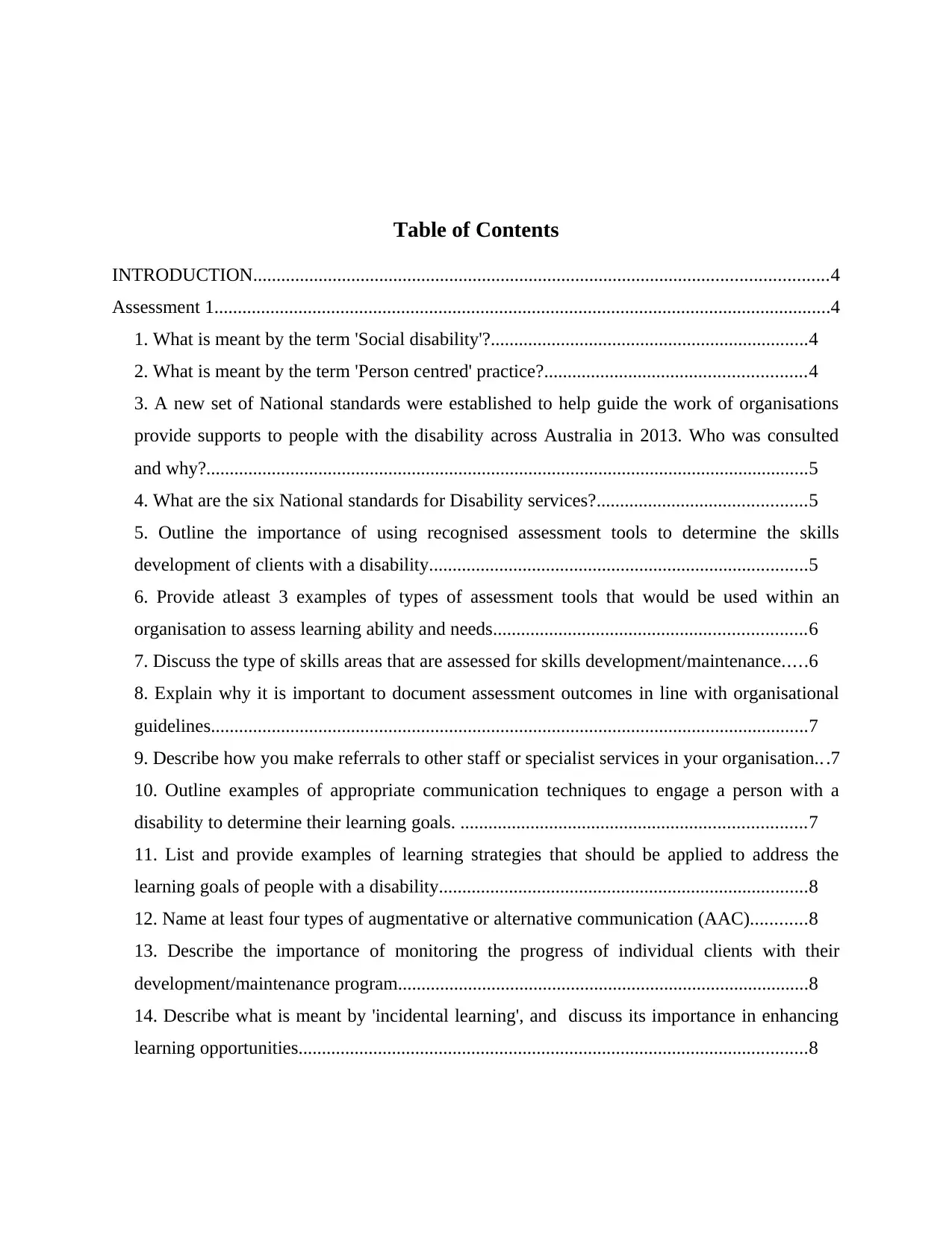
Table of Contents
INTRODUCTION...........................................................................................................................4
Assessment 1....................................................................................................................................4
1. What is meant by the term 'Social disability'?....................................................................4
2. What is meant by the term 'Person centred' practice?........................................................4
3. A new set of National standards were established to help guide the work of organisations
provide supports to people with the disability across Australia in 2013. Who was consulted
and why?.................................................................................................................................5
4. What are the six National standards for Disability services?.............................................5
5. Outline the importance of using recognised assessment tools to determine the skills
development of clients with a disability.................................................................................5
6. Provide atleast 3 examples of types of assessment tools that would be used within an
organisation to assess learning ability and needs...................................................................6
7. Discuss the type of skills areas that are assessed for skills development/maintenance.....6
8. Explain why it is important to document assessment outcomes in line with organisational
guidelines................................................................................................................................7
9. Describe how you make referrals to other staff or specialist services in your organisation.. .7
10. Outline examples of appropriate communication techniques to engage a person with a
disability to determine their learning goals. ..........................................................................7
11. List and provide examples of learning strategies that should be applied to address the
learning goals of people with a disability...............................................................................8
12. Name at least four types of augmentative or alternative communication (AAC)............8
13. Describe the importance of monitoring the progress of individual clients with their
development/maintenance program........................................................................................8
14. Describe what is meant by 'incidental learning', and discuss its importance in enhancing
learning opportunities.............................................................................................................8
INTRODUCTION...........................................................................................................................4
Assessment 1....................................................................................................................................4
1. What is meant by the term 'Social disability'?....................................................................4
2. What is meant by the term 'Person centred' practice?........................................................4
3. A new set of National standards were established to help guide the work of organisations
provide supports to people with the disability across Australia in 2013. Who was consulted
and why?.................................................................................................................................5
4. What are the six National standards for Disability services?.............................................5
5. Outline the importance of using recognised assessment tools to determine the skills
development of clients with a disability.................................................................................5
6. Provide atleast 3 examples of types of assessment tools that would be used within an
organisation to assess learning ability and needs...................................................................6
7. Discuss the type of skills areas that are assessed for skills development/maintenance.....6
8. Explain why it is important to document assessment outcomes in line with organisational
guidelines................................................................................................................................7
9. Describe how you make referrals to other staff or specialist services in your organisation.. .7
10. Outline examples of appropriate communication techniques to engage a person with a
disability to determine their learning goals. ..........................................................................7
11. List and provide examples of learning strategies that should be applied to address the
learning goals of people with a disability...............................................................................8
12. Name at least four types of augmentative or alternative communication (AAC)............8
13. Describe the importance of monitoring the progress of individual clients with their
development/maintenance program........................................................................................8
14. Describe what is meant by 'incidental learning', and discuss its importance in enhancing
learning opportunities.............................................................................................................8
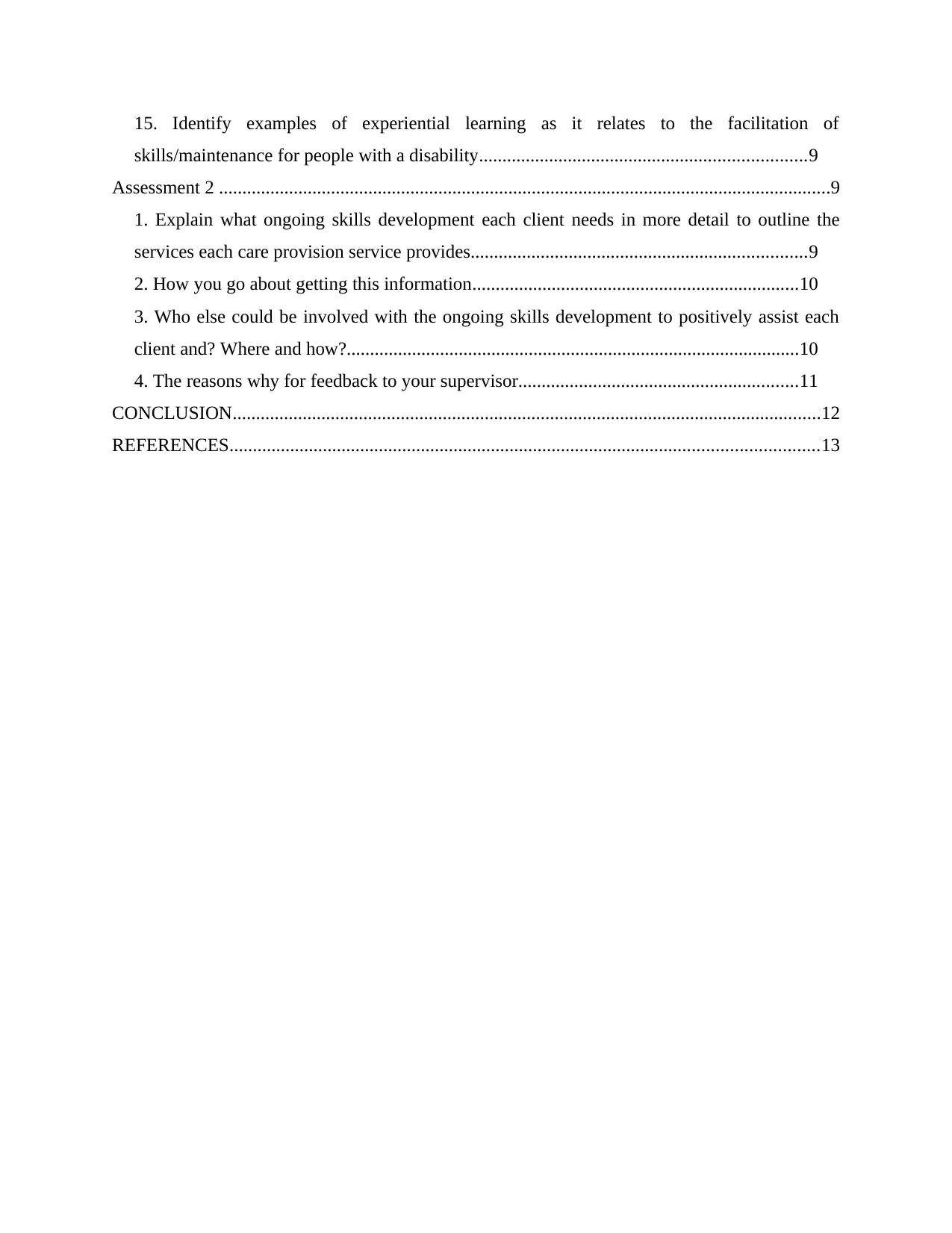
15. Identify examples of experiential learning as it relates to the facilitation of
skills/maintenance for people with a disability......................................................................9
Assessment 2 ...................................................................................................................................9
1. Explain what ongoing skills development each client needs in more detail to outline the
services each care provision service provides........................................................................9
2. How you go about getting this information......................................................................10
3. Who else could be involved with the ongoing skills development to positively assist each
client and? Where and how?.................................................................................................10
4. The reasons why for feedback to your supervisor............................................................11
CONCLUSION..............................................................................................................................12
REFERENCES..............................................................................................................................13
skills/maintenance for people with a disability......................................................................9
Assessment 2 ...................................................................................................................................9
1. Explain what ongoing skills development each client needs in more detail to outline the
services each care provision service provides........................................................................9
2. How you go about getting this information......................................................................10
3. Who else could be involved with the ongoing skills development to positively assist each
client and? Where and how?.................................................................................................10
4. The reasons why for feedback to your supervisor............................................................11
CONCLUSION..............................................................................................................................12
REFERENCES..............................................................................................................................13
⊘ This is a preview!⊘
Do you want full access?
Subscribe today to unlock all pages.

Trusted by 1+ million students worldwide
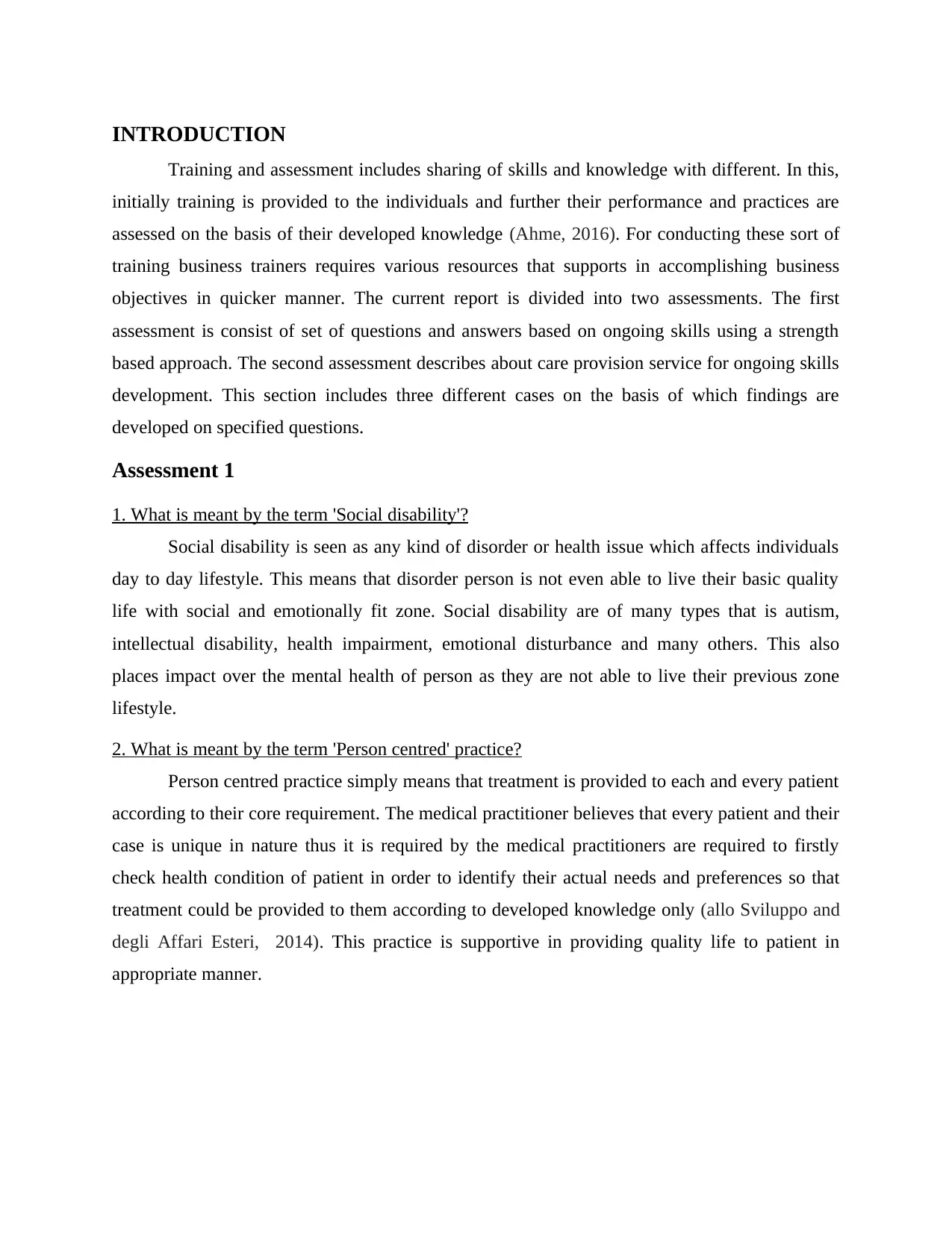
INTRODUCTION
Training and assessment includes sharing of skills and knowledge with different. In this,
initially training is provided to the individuals and further their performance and practices are
assessed on the basis of their developed knowledge (Ahme, 2016). For conducting these sort of
training business trainers requires various resources that supports in accomplishing business
objectives in quicker manner. The current report is divided into two assessments. The first
assessment is consist of set of questions and answers based on ongoing skills using a strength
based approach. The second assessment describes about care provision service for ongoing skills
development. This section includes three different cases on the basis of which findings are
developed on specified questions.
Assessment 1
1. What is meant by the term 'Social disability'?
Social disability is seen as any kind of disorder or health issue which affects individuals
day to day lifestyle. This means that disorder person is not even able to live their basic quality
life with social and emotionally fit zone. Social disability are of many types that is autism,
intellectual disability, health impairment, emotional disturbance and many others. This also
places impact over the mental health of person as they are not able to live their previous zone
lifestyle.
2. What is meant by the term 'Person centred' practice?
Person centred practice simply means that treatment is provided to each and every patient
according to their core requirement. The medical practitioner believes that every patient and their
case is unique in nature thus it is required by the medical practitioners are required to firstly
check health condition of patient in order to identify their actual needs and preferences so that
treatment could be provided to them according to developed knowledge only (allo Sviluppo and
degli Affari Esteri, 2014). This practice is supportive in providing quality life to patient in
appropriate manner.
Training and assessment includes sharing of skills and knowledge with different. In this,
initially training is provided to the individuals and further their performance and practices are
assessed on the basis of their developed knowledge (Ahme, 2016). For conducting these sort of
training business trainers requires various resources that supports in accomplishing business
objectives in quicker manner. The current report is divided into two assessments. The first
assessment is consist of set of questions and answers based on ongoing skills using a strength
based approach. The second assessment describes about care provision service for ongoing skills
development. This section includes three different cases on the basis of which findings are
developed on specified questions.
Assessment 1
1. What is meant by the term 'Social disability'?
Social disability is seen as any kind of disorder or health issue which affects individuals
day to day lifestyle. This means that disorder person is not even able to live their basic quality
life with social and emotionally fit zone. Social disability are of many types that is autism,
intellectual disability, health impairment, emotional disturbance and many others. This also
places impact over the mental health of person as they are not able to live their previous zone
lifestyle.
2. What is meant by the term 'Person centred' practice?
Person centred practice simply means that treatment is provided to each and every patient
according to their core requirement. The medical practitioner believes that every patient and their
case is unique in nature thus it is required by the medical practitioners are required to firstly
check health condition of patient in order to identify their actual needs and preferences so that
treatment could be provided to them according to developed knowledge only (allo Sviluppo and
degli Affari Esteri, 2014). This practice is supportive in providing quality life to patient in
appropriate manner.
Paraphrase This Document
Need a fresh take? Get an instant paraphrase of this document with our AI Paraphraser
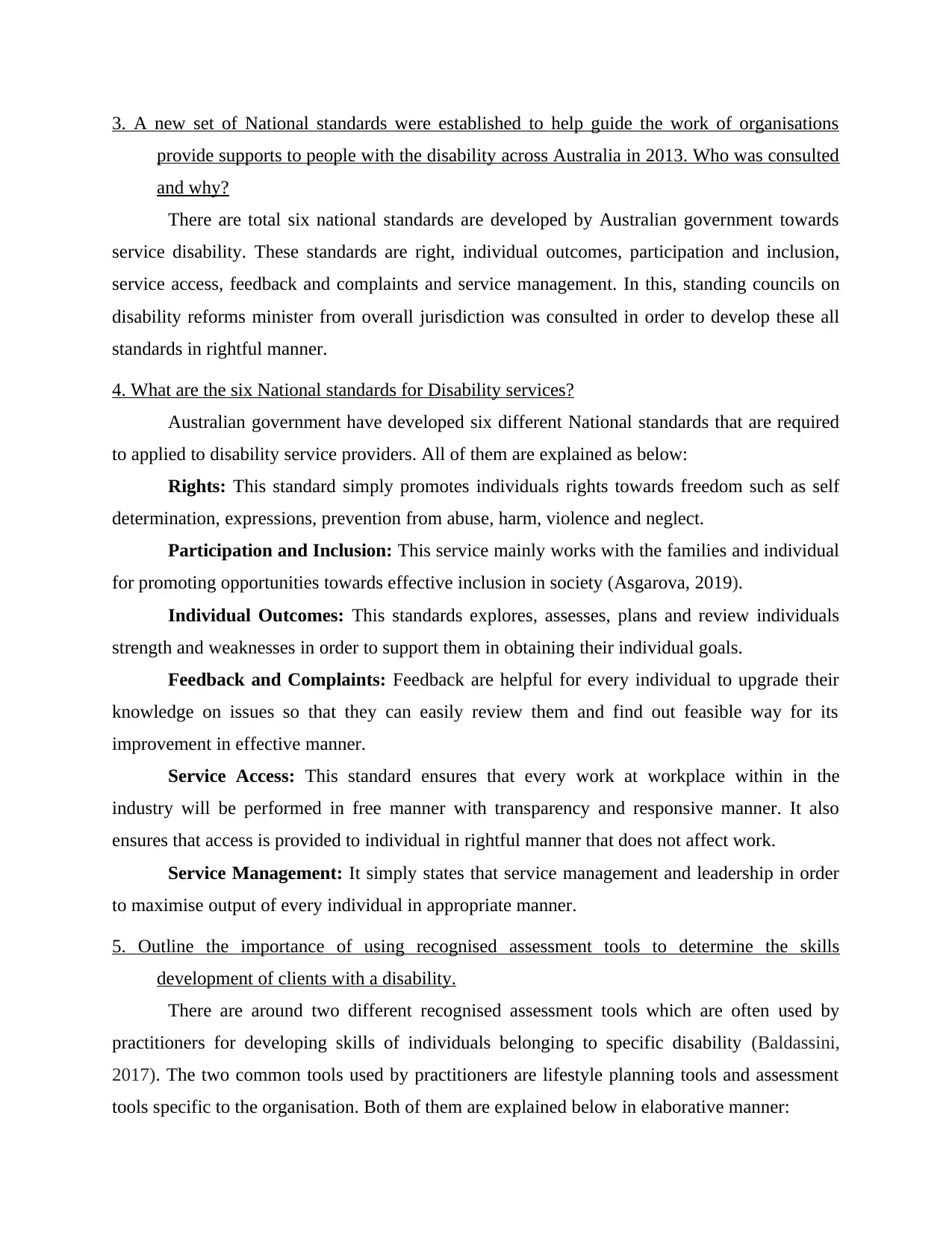
3. A new set of National standards were established to help guide the work of organisations
provide supports to people with the disability across Australia in 2013. Who was consulted
and why?
There are total six national standards are developed by Australian government towards
service disability. These standards are right, individual outcomes, participation and inclusion,
service access, feedback and complaints and service management. In this, standing councils on
disability reforms minister from overall jurisdiction was consulted in order to develop these all
standards in rightful manner.
4. What are the six National standards for Disability services?
Australian government have developed six different National standards that are required
to applied to disability service providers. All of them are explained as below:
Rights: This standard simply promotes individuals rights towards freedom such as self
determination, expressions, prevention from abuse, harm, violence and neglect.
Participation and Inclusion: This service mainly works with the families and individual
for promoting opportunities towards effective inclusion in society (Asgarova, 2019).
Individual Outcomes: This standards explores, assesses, plans and review individuals
strength and weaknesses in order to support them in obtaining their individual goals.
Feedback and Complaints: Feedback are helpful for every individual to upgrade their
knowledge on issues so that they can easily review them and find out feasible way for its
improvement in effective manner.
Service Access: This standard ensures that every work at workplace within in the
industry will be performed in free manner with transparency and responsive manner. It also
ensures that access is provided to individual in rightful manner that does not affect work.
Service Management: It simply states that service management and leadership in order
to maximise output of every individual in appropriate manner.
5. Outline the importance of using recognised assessment tools to determine the skills
development of clients with a disability.
There are around two different recognised assessment tools which are often used by
practitioners for developing skills of individuals belonging to specific disability (Baldassini,
2017). The two common tools used by practitioners are lifestyle planning tools and assessment
tools specific to the organisation. Both of them are explained below in elaborative manner:
provide supports to people with the disability across Australia in 2013. Who was consulted
and why?
There are total six national standards are developed by Australian government towards
service disability. These standards are right, individual outcomes, participation and inclusion,
service access, feedback and complaints and service management. In this, standing councils on
disability reforms minister from overall jurisdiction was consulted in order to develop these all
standards in rightful manner.
4. What are the six National standards for Disability services?
Australian government have developed six different National standards that are required
to applied to disability service providers. All of them are explained as below:
Rights: This standard simply promotes individuals rights towards freedom such as self
determination, expressions, prevention from abuse, harm, violence and neglect.
Participation and Inclusion: This service mainly works with the families and individual
for promoting opportunities towards effective inclusion in society (Asgarova, 2019).
Individual Outcomes: This standards explores, assesses, plans and review individuals
strength and weaknesses in order to support them in obtaining their individual goals.
Feedback and Complaints: Feedback are helpful for every individual to upgrade their
knowledge on issues so that they can easily review them and find out feasible way for its
improvement in effective manner.
Service Access: This standard ensures that every work at workplace within in the
industry will be performed in free manner with transparency and responsive manner. It also
ensures that access is provided to individual in rightful manner that does not affect work.
Service Management: It simply states that service management and leadership in order
to maximise output of every individual in appropriate manner.
5. Outline the importance of using recognised assessment tools to determine the skills
development of clients with a disability.
There are around two different recognised assessment tools which are often used by
practitioners for developing skills of individuals belonging to specific disability (Baldassini,
2017). The two common tools used by practitioners are lifestyle planning tools and assessment
tools specific to the organisation. Both of them are explained below in elaborative manner:
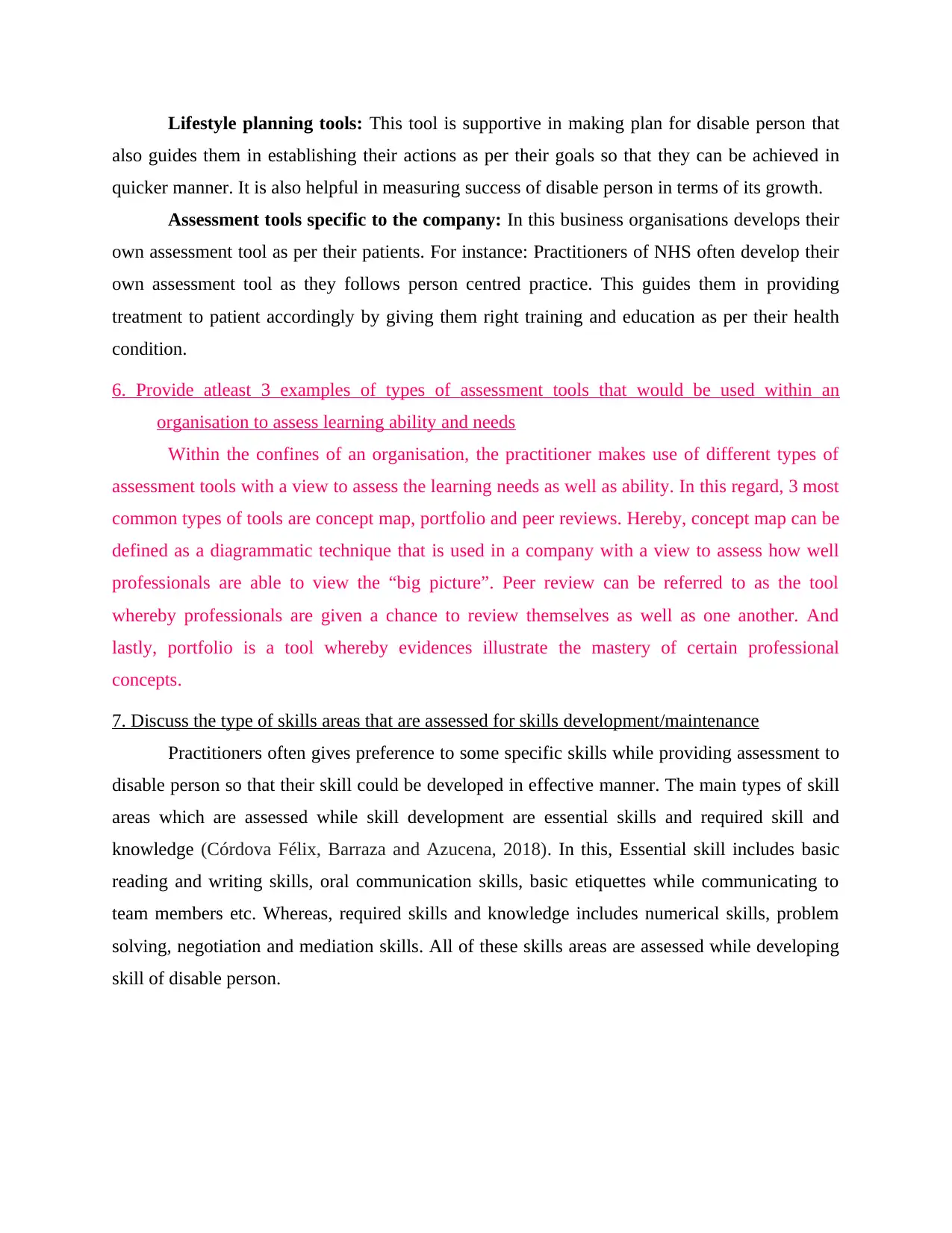
Lifestyle planning tools: This tool is supportive in making plan for disable person that
also guides them in establishing their actions as per their goals so that they can be achieved in
quicker manner. It is also helpful in measuring success of disable person in terms of its growth.
Assessment tools specific to the company: In this business organisations develops their
own assessment tool as per their patients. For instance: Practitioners of NHS often develop their
own assessment tool as they follows person centred practice. This guides them in providing
treatment to patient accordingly by giving them right training and education as per their health
condition.
6. Provide atleast 3 examples of types of assessment tools that would be used within an
organisation to assess learning ability and needs
Within the confines of an organisation, the practitioner makes use of different types of
assessment tools with a view to assess the learning needs as well as ability. In this regard, 3 most
common types of tools are concept map, portfolio and peer reviews. Hereby, concept map can be
defined as a diagrammatic technique that is used in a company with a view to assess how well
professionals are able to view the “big picture”. Peer review can be referred to as the tool
whereby professionals are given a chance to review themselves as well as one another. And
lastly, portfolio is a tool whereby evidences illustrate the mastery of certain professional
concepts.
7. Discuss the type of skills areas that are assessed for skills development/maintenance
Practitioners often gives preference to some specific skills while providing assessment to
disable person so that their skill could be developed in effective manner. The main types of skill
areas which are assessed while skill development are essential skills and required skill and
knowledge (Córdova Félix, Barraza and Azucena, 2018). In this, Essential skill includes basic
reading and writing skills, oral communication skills, basic etiquettes while communicating to
team members etc. Whereas, required skills and knowledge includes numerical skills, problem
solving, negotiation and mediation skills. All of these skills areas are assessed while developing
skill of disable person.
also guides them in establishing their actions as per their goals so that they can be achieved in
quicker manner. It is also helpful in measuring success of disable person in terms of its growth.
Assessment tools specific to the company: In this business organisations develops their
own assessment tool as per their patients. For instance: Practitioners of NHS often develop their
own assessment tool as they follows person centred practice. This guides them in providing
treatment to patient accordingly by giving them right training and education as per their health
condition.
6. Provide atleast 3 examples of types of assessment tools that would be used within an
organisation to assess learning ability and needs
Within the confines of an organisation, the practitioner makes use of different types of
assessment tools with a view to assess the learning needs as well as ability. In this regard, 3 most
common types of tools are concept map, portfolio and peer reviews. Hereby, concept map can be
defined as a diagrammatic technique that is used in a company with a view to assess how well
professionals are able to view the “big picture”. Peer review can be referred to as the tool
whereby professionals are given a chance to review themselves as well as one another. And
lastly, portfolio is a tool whereby evidences illustrate the mastery of certain professional
concepts.
7. Discuss the type of skills areas that are assessed for skills development/maintenance
Practitioners often gives preference to some specific skills while providing assessment to
disable person so that their skill could be developed in effective manner. The main types of skill
areas which are assessed while skill development are essential skills and required skill and
knowledge (Córdova Félix, Barraza and Azucena, 2018). In this, Essential skill includes basic
reading and writing skills, oral communication skills, basic etiquettes while communicating to
team members etc. Whereas, required skills and knowledge includes numerical skills, problem
solving, negotiation and mediation skills. All of these skills areas are assessed while developing
skill of disable person.
⊘ This is a preview!⊘
Do you want full access?
Subscribe today to unlock all pages.

Trusted by 1+ million students worldwide
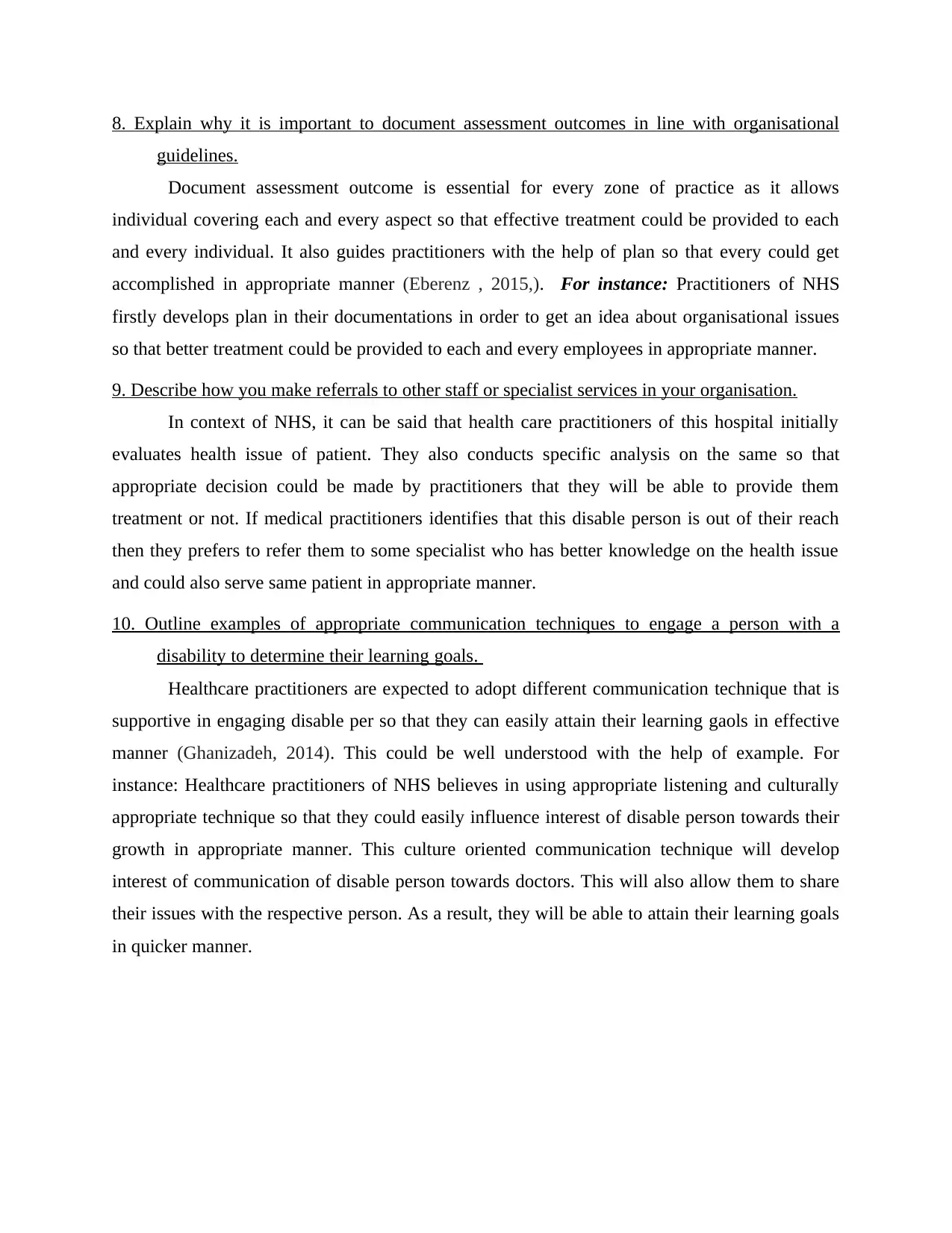
8. Explain why it is important to document assessment outcomes in line with organisational
guidelines.
Document assessment outcome is essential for every zone of practice as it allows
individual covering each and every aspect so that effective treatment could be provided to each
and every individual. It also guides practitioners with the help of plan so that every could get
accomplished in appropriate manner (Eberenz , 2015,). For instance: Practitioners of NHS
firstly develops plan in their documentations in order to get an idea about organisational issues
so that better treatment could be provided to each and every employees in appropriate manner.
9. Describe how you make referrals to other staff or specialist services in your organisation.
In context of NHS, it can be said that health care practitioners of this hospital initially
evaluates health issue of patient. They also conducts specific analysis on the same so that
appropriate decision could be made by practitioners that they will be able to provide them
treatment or not. If medical practitioners identifies that this disable person is out of their reach
then they prefers to refer them to some specialist who has better knowledge on the health issue
and could also serve same patient in appropriate manner.
10. Outline examples of appropriate communication techniques to engage a person with a
disability to determine their learning goals.
Healthcare practitioners are expected to adopt different communication technique that is
supportive in engaging disable per so that they can easily attain their learning gaols in effective
manner (Ghanizadeh, 2014). This could be well understood with the help of example. For
instance: Healthcare practitioners of NHS believes in using appropriate listening and culturally
appropriate technique so that they could easily influence interest of disable person towards their
growth in appropriate manner. This culture oriented communication technique will develop
interest of communication of disable person towards doctors. This will also allow them to share
their issues with the respective person. As a result, they will be able to attain their learning goals
in quicker manner.
guidelines.
Document assessment outcome is essential for every zone of practice as it allows
individual covering each and every aspect so that effective treatment could be provided to each
and every individual. It also guides practitioners with the help of plan so that every could get
accomplished in appropriate manner (Eberenz , 2015,). For instance: Practitioners of NHS
firstly develops plan in their documentations in order to get an idea about organisational issues
so that better treatment could be provided to each and every employees in appropriate manner.
9. Describe how you make referrals to other staff or specialist services in your organisation.
In context of NHS, it can be said that health care practitioners of this hospital initially
evaluates health issue of patient. They also conducts specific analysis on the same so that
appropriate decision could be made by practitioners that they will be able to provide them
treatment or not. If medical practitioners identifies that this disable person is out of their reach
then they prefers to refer them to some specialist who has better knowledge on the health issue
and could also serve same patient in appropriate manner.
10. Outline examples of appropriate communication techniques to engage a person with a
disability to determine their learning goals.
Healthcare practitioners are expected to adopt different communication technique that is
supportive in engaging disable per so that they can easily attain their learning gaols in effective
manner (Ghanizadeh, 2014). This could be well understood with the help of example. For
instance: Healthcare practitioners of NHS believes in using appropriate listening and culturally
appropriate technique so that they could easily influence interest of disable person towards their
growth in appropriate manner. This culture oriented communication technique will develop
interest of communication of disable person towards doctors. This will also allow them to share
their issues with the respective person. As a result, they will be able to attain their learning goals
in quicker manner.
Paraphrase This Document
Need a fresh take? Get an instant paraphrase of this document with our AI Paraphraser
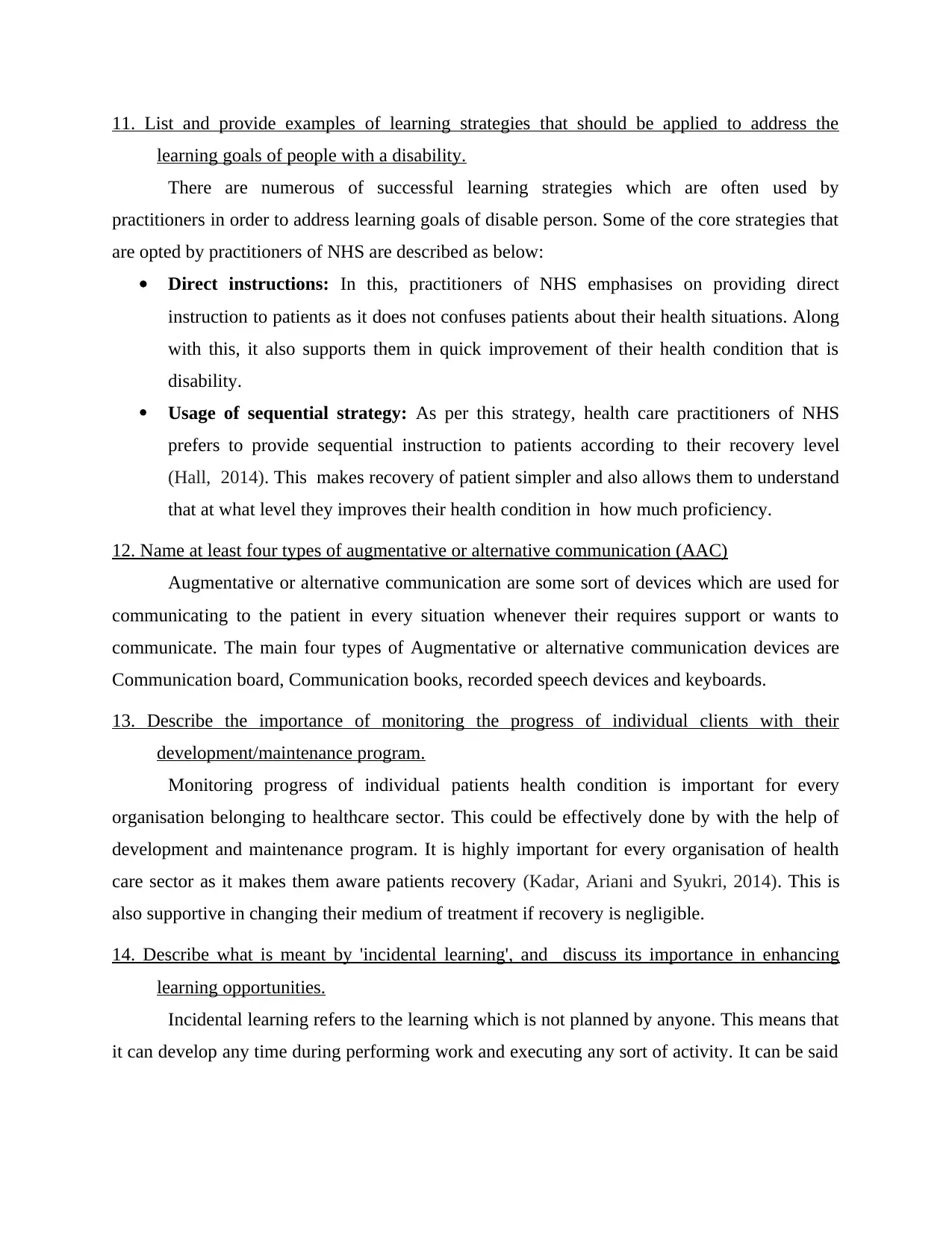
11. List and provide examples of learning strategies that should be applied to address the
learning goals of people with a disability.
There are numerous of successful learning strategies which are often used by
practitioners in order to address learning goals of disable person. Some of the core strategies that
are opted by practitioners of NHS are described as below:
Direct instructions: In this, practitioners of NHS emphasises on providing direct
instruction to patients as it does not confuses patients about their health situations. Along
with this, it also supports them in quick improvement of their health condition that is
disability.
Usage of sequential strategy: As per this strategy, health care practitioners of NHS
prefers to provide sequential instruction to patients according to their recovery level
(Hall, 2014). This makes recovery of patient simpler and also allows them to understand
that at what level they improves their health condition in how much proficiency.
12. Name at least four types of augmentative or alternative communication (AAC)
Augmentative or alternative communication are some sort of devices which are used for
communicating to the patient in every situation whenever their requires support or wants to
communicate. The main four types of Augmentative or alternative communication devices are
Communication board, Communication books, recorded speech devices and keyboards.
13. Describe the importance of monitoring the progress of individual clients with their
development/maintenance program.
Monitoring progress of individual patients health condition is important for every
organisation belonging to healthcare sector. This could be effectively done by with the help of
development and maintenance program. It is highly important for every organisation of health
care sector as it makes them aware patients recovery (Kadar, Ariani and Syukri, 2014). This is
also supportive in changing their medium of treatment if recovery is negligible.
14. Describe what is meant by 'incidental learning', and discuss its importance in enhancing
learning opportunities.
Incidental learning refers to the learning which is not planned by anyone. This means that
it can develop any time during performing work and executing any sort of activity. It can be said
learning goals of people with a disability.
There are numerous of successful learning strategies which are often used by
practitioners in order to address learning goals of disable person. Some of the core strategies that
are opted by practitioners of NHS are described as below:
Direct instructions: In this, practitioners of NHS emphasises on providing direct
instruction to patients as it does not confuses patients about their health situations. Along
with this, it also supports them in quick improvement of their health condition that is
disability.
Usage of sequential strategy: As per this strategy, health care practitioners of NHS
prefers to provide sequential instruction to patients according to their recovery level
(Hall, 2014). This makes recovery of patient simpler and also allows them to understand
that at what level they improves their health condition in how much proficiency.
12. Name at least four types of augmentative or alternative communication (AAC)
Augmentative or alternative communication are some sort of devices which are used for
communicating to the patient in every situation whenever their requires support or wants to
communicate. The main four types of Augmentative or alternative communication devices are
Communication board, Communication books, recorded speech devices and keyboards.
13. Describe the importance of monitoring the progress of individual clients with their
development/maintenance program.
Monitoring progress of individual patients health condition is important for every
organisation belonging to healthcare sector. This could be effectively done by with the help of
development and maintenance program. It is highly important for every organisation of health
care sector as it makes them aware patients recovery (Kadar, Ariani and Syukri, 2014). This is
also supportive in changing their medium of treatment if recovery is negligible.
14. Describe what is meant by 'incidental learning', and discuss its importance in enhancing
learning opportunities.
Incidental learning refers to the learning which is not planned by anyone. This means that
it can develop any time during performing work and executing any sort of activity. It can be said
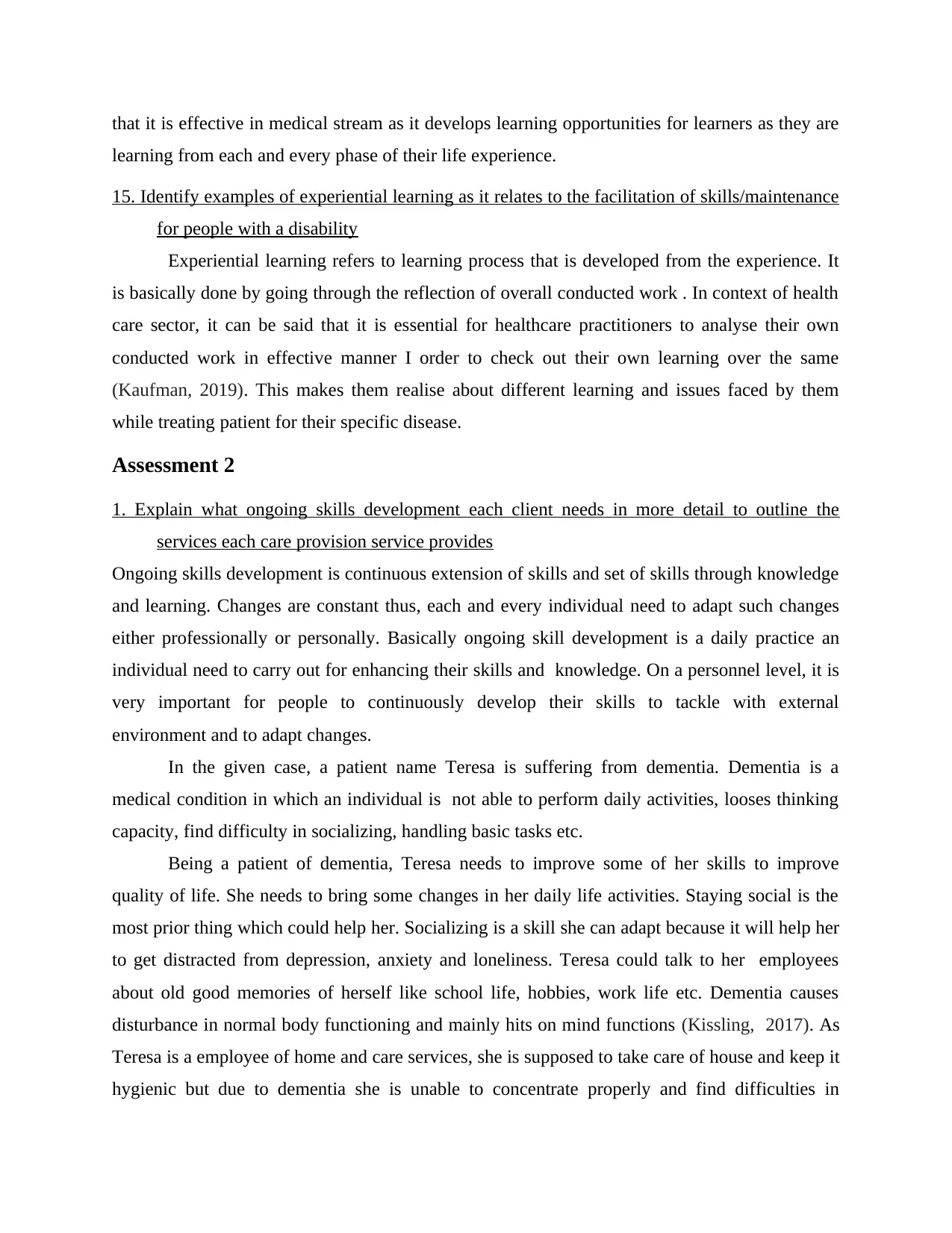
that it is effective in medical stream as it develops learning opportunities for learners as they are
learning from each and every phase of their life experience.
15. Identify examples of experiential learning as it relates to the facilitation of skills/maintenance
for people with a disability
Experiential learning refers to learning process that is developed from the experience. It
is basically done by going through the reflection of overall conducted work . In context of health
care sector, it can be said that it is essential for healthcare practitioners to analyse their own
conducted work in effective manner I order to check out their own learning over the same
(Kaufman, 2019). This makes them realise about different learning and issues faced by them
while treating patient for their specific disease.
Assessment 2
1. Explain what ongoing skills development each client needs in more detail to outline the
services each care provision service provides
Ongoing skills development is continuous extension of skills and set of skills through knowledge
and learning. Changes are constant thus, each and every individual need to adapt such changes
either professionally or personally. Basically ongoing skill development is a daily practice an
individual need to carry out for enhancing their skills and knowledge. On a personnel level, it is
very important for people to continuously develop their skills to tackle with external
environment and to adapt changes.
In the given case, a patient name Teresa is suffering from dementia. Dementia is a
medical condition in which an individual is not able to perform daily activities, looses thinking
capacity, find difficulty in socializing, handling basic tasks etc.
Being a patient of dementia, Teresa needs to improve some of her skills to improve
quality of life. She needs to bring some changes in her daily life activities. Staying social is the
most prior thing which could help her. Socializing is a skill she can adapt because it will help her
to get distracted from depression, anxiety and loneliness. Teresa could talk to her employees
about old good memories of herself like school life, hobbies, work life etc. Dementia causes
disturbance in normal body functioning and mainly hits on mind functions (Kissling, 2017). As
Teresa is a employee of home and care services, she is supposed to take care of house and keep it
hygienic but due to dementia she is unable to concentrate properly and find difficulties in
learning from each and every phase of their life experience.
15. Identify examples of experiential learning as it relates to the facilitation of skills/maintenance
for people with a disability
Experiential learning refers to learning process that is developed from the experience. It
is basically done by going through the reflection of overall conducted work . In context of health
care sector, it can be said that it is essential for healthcare practitioners to analyse their own
conducted work in effective manner I order to check out their own learning over the same
(Kaufman, 2019). This makes them realise about different learning and issues faced by them
while treating patient for their specific disease.
Assessment 2
1. Explain what ongoing skills development each client needs in more detail to outline the
services each care provision service provides
Ongoing skills development is continuous extension of skills and set of skills through knowledge
and learning. Changes are constant thus, each and every individual need to adapt such changes
either professionally or personally. Basically ongoing skill development is a daily practice an
individual need to carry out for enhancing their skills and knowledge. On a personnel level, it is
very important for people to continuously develop their skills to tackle with external
environment and to adapt changes.
In the given case, a patient name Teresa is suffering from dementia. Dementia is a
medical condition in which an individual is not able to perform daily activities, looses thinking
capacity, find difficulty in socializing, handling basic tasks etc.
Being a patient of dementia, Teresa needs to improve some of her skills to improve
quality of life. She needs to bring some changes in her daily life activities. Staying social is the
most prior thing which could help her. Socializing is a skill she can adapt because it will help her
to get distracted from depression, anxiety and loneliness. Teresa could talk to her employees
about old good memories of herself like school life, hobbies, work life etc. Dementia causes
disturbance in normal body functioning and mainly hits on mind functions (Kissling, 2017). As
Teresa is a employee of home and care services, she is supposed to take care of house and keep it
hygienic but due to dementia she is unable to concentrate properly and find difficulties in
⊘ This is a preview!⊘
Do you want full access?
Subscribe today to unlock all pages.

Trusted by 1+ million students worldwide
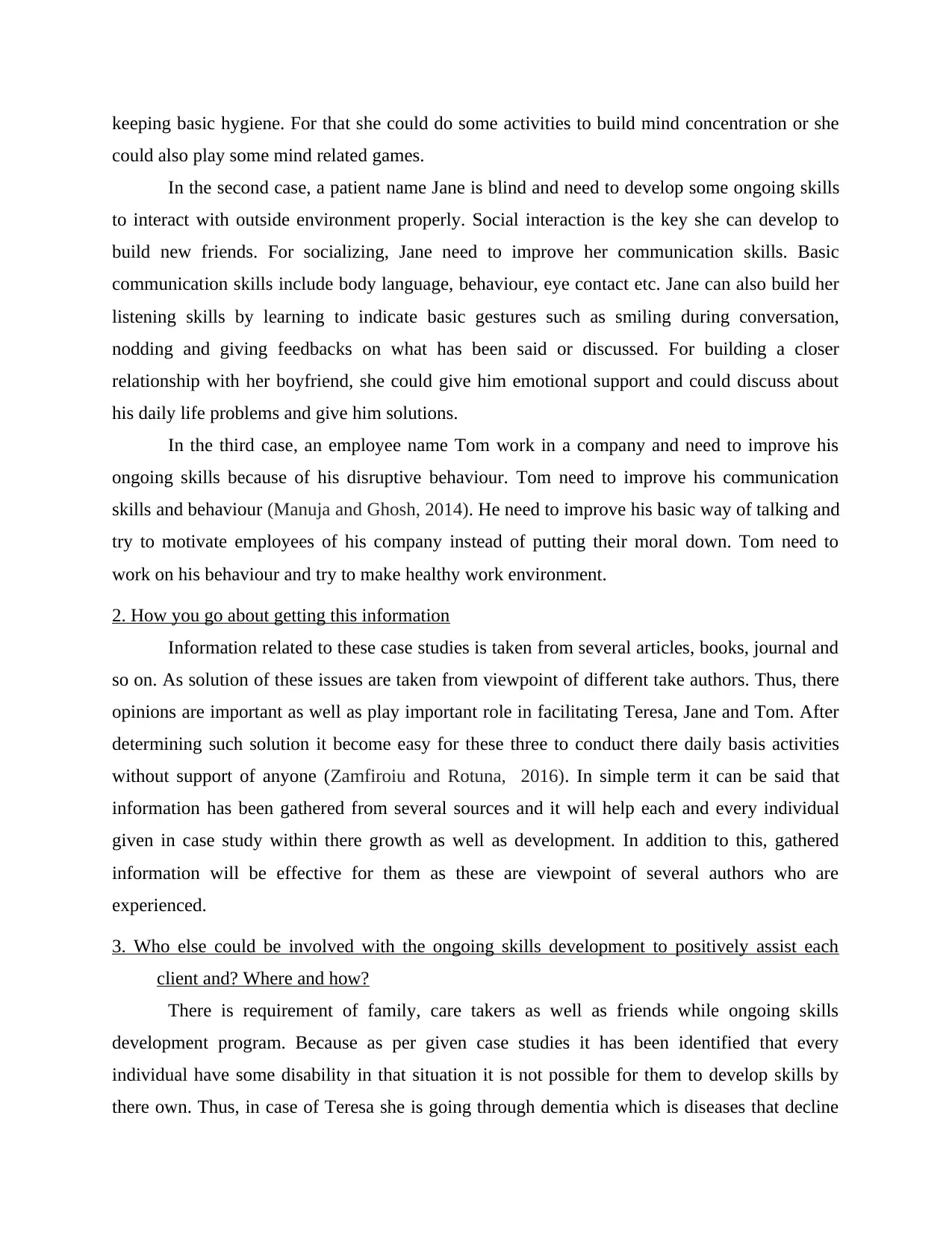
keeping basic hygiene. For that she could do some activities to build mind concentration or she
could also play some mind related games.
In the second case, a patient name Jane is blind and need to develop some ongoing skills
to interact with outside environment properly. Social interaction is the key she can develop to
build new friends. For socializing, Jane need to improve her communication skills. Basic
communication skills include body language, behaviour, eye contact etc. Jane can also build her
listening skills by learning to indicate basic gestures such as smiling during conversation,
nodding and giving feedbacks on what has been said or discussed. For building a closer
relationship with her boyfriend, she could give him emotional support and could discuss about
his daily life problems and give him solutions.
In the third case, an employee name Tom work in a company and need to improve his
ongoing skills because of his disruptive behaviour. Tom need to improve his communication
skills and behaviour (Manuja and Ghosh, 2014). He need to improve his basic way of talking and
try to motivate employees of his company instead of putting their moral down. Tom need to
work on his behaviour and try to make healthy work environment.
2. How you go about getting this information
Information related to these case studies is taken from several articles, books, journal and
so on. As solution of these issues are taken from viewpoint of different take authors. Thus, there
opinions are important as well as play important role in facilitating Teresa, Jane and Tom. After
determining such solution it become easy for these three to conduct there daily basis activities
without support of anyone (Zamfiroiu and Rotuna, 2016). In simple term it can be said that
information has been gathered from several sources and it will help each and every individual
given in case study within there growth as well as development. In addition to this, gathered
information will be effective for them as these are viewpoint of several authors who are
experienced.
3. Who else could be involved with the ongoing skills development to positively assist each
client and? Where and how?
There is requirement of family, care takers as well as friends while ongoing skills
development program. Because as per given case studies it has been identified that every
individual have some disability in that situation it is not possible for them to develop skills by
there own. Thus, in case of Teresa she is going through dementia which is diseases that decline
could also play some mind related games.
In the second case, a patient name Jane is blind and need to develop some ongoing skills
to interact with outside environment properly. Social interaction is the key she can develop to
build new friends. For socializing, Jane need to improve her communication skills. Basic
communication skills include body language, behaviour, eye contact etc. Jane can also build her
listening skills by learning to indicate basic gestures such as smiling during conversation,
nodding and giving feedbacks on what has been said or discussed. For building a closer
relationship with her boyfriend, she could give him emotional support and could discuss about
his daily life problems and give him solutions.
In the third case, an employee name Tom work in a company and need to improve his
ongoing skills because of his disruptive behaviour. Tom need to improve his communication
skills and behaviour (Manuja and Ghosh, 2014). He need to improve his basic way of talking and
try to motivate employees of his company instead of putting their moral down. Tom need to
work on his behaviour and try to make healthy work environment.
2. How you go about getting this information
Information related to these case studies is taken from several articles, books, journal and
so on. As solution of these issues are taken from viewpoint of different take authors. Thus, there
opinions are important as well as play important role in facilitating Teresa, Jane and Tom. After
determining such solution it become easy for these three to conduct there daily basis activities
without support of anyone (Zamfiroiu and Rotuna, 2016). In simple term it can be said that
information has been gathered from several sources and it will help each and every individual
given in case study within there growth as well as development. In addition to this, gathered
information will be effective for them as these are viewpoint of several authors who are
experienced.
3. Who else could be involved with the ongoing skills development to positively assist each
client and? Where and how?
There is requirement of family, care takers as well as friends while ongoing skills
development program. Because as per given case studies it has been identified that every
individual have some disability in that situation it is not possible for them to develop skills by
there own. Thus, in case of Teresa she is going through dementia which is diseases that decline
Paraphrase This Document
Need a fresh take? Get an instant paraphrase of this document with our AI Paraphraser
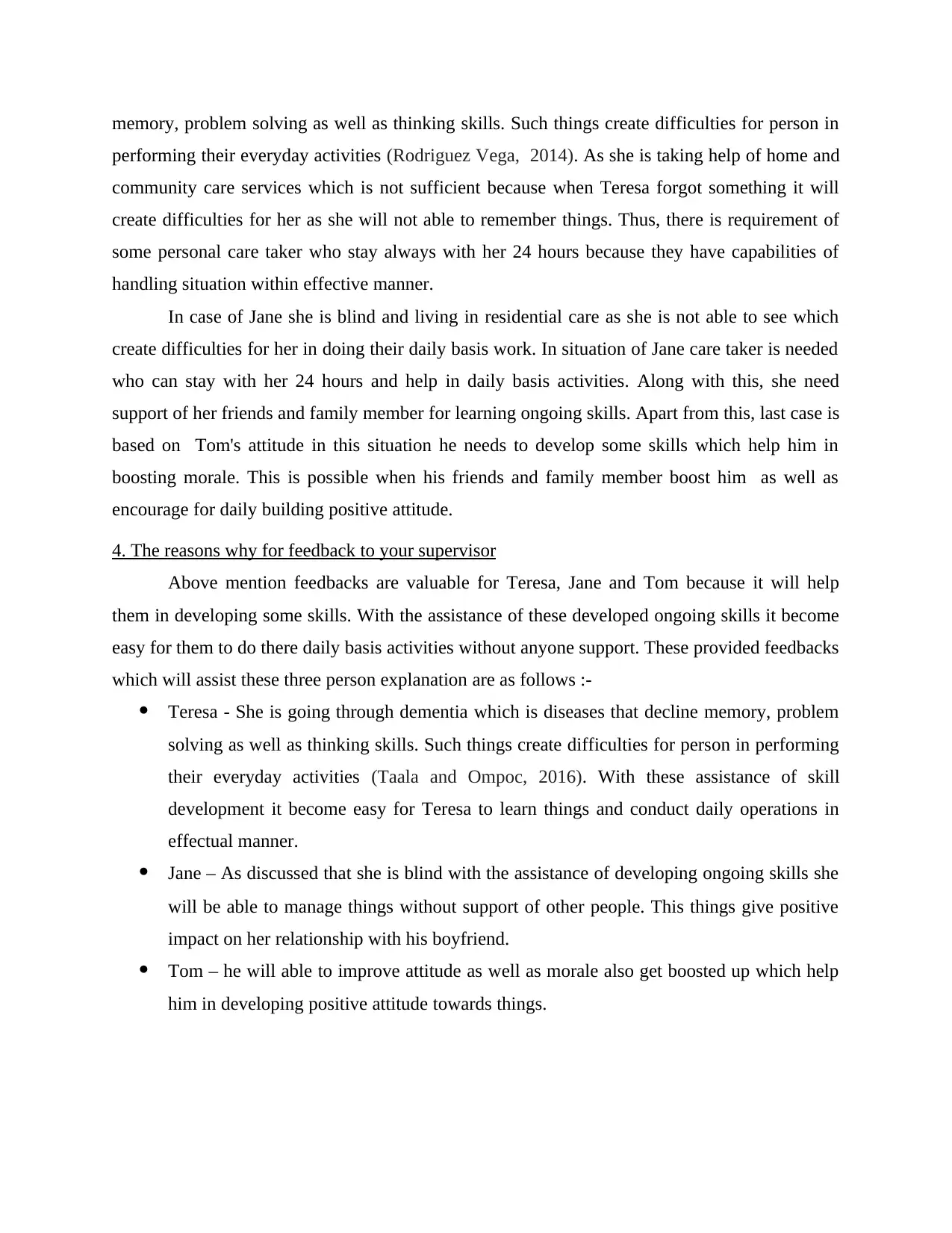
memory, problem solving as well as thinking skills. Such things create difficulties for person in
performing their everyday activities (Rodriguez Vega, 2014). As she is taking help of home and
community care services which is not sufficient because when Teresa forgot something it will
create difficulties for her as she will not able to remember things. Thus, there is requirement of
some personal care taker who stay always with her 24 hours because they have capabilities of
handling situation within effective manner.
In case of Jane she is blind and living in residential care as she is not able to see which
create difficulties for her in doing their daily basis work. In situation of Jane care taker is needed
who can stay with her 24 hours and help in daily basis activities. Along with this, she need
support of her friends and family member for learning ongoing skills. Apart from this, last case is
based on Tom's attitude in this situation he needs to develop some skills which help him in
boosting morale. This is possible when his friends and family member boost him as well as
encourage for daily building positive attitude.
4. The reasons why for feedback to your supervisor
Above mention feedbacks are valuable for Teresa, Jane and Tom because it will help
them in developing some skills. With the assistance of these developed ongoing skills it become
easy for them to do there daily basis activities without anyone support. These provided feedbacks
which will assist these three person explanation are as follows :-
Teresa - She is going through dementia which is diseases that decline memory, problem
solving as well as thinking skills. Such things create difficulties for person in performing
their everyday activities (Taala and Ompoc, 2016). With these assistance of skill
development it become easy for Teresa to learn things and conduct daily operations in
effectual manner.
Jane – As discussed that she is blind with the assistance of developing ongoing skills she
will be able to manage things without support of other people. This things give positive
impact on her relationship with his boyfriend.
Tom – he will able to improve attitude as well as morale also get boosted up which help
him in developing positive attitude towards things.
performing their everyday activities (Rodriguez Vega, 2014). As she is taking help of home and
community care services which is not sufficient because when Teresa forgot something it will
create difficulties for her as she will not able to remember things. Thus, there is requirement of
some personal care taker who stay always with her 24 hours because they have capabilities of
handling situation within effective manner.
In case of Jane she is blind and living in residential care as she is not able to see which
create difficulties for her in doing their daily basis work. In situation of Jane care taker is needed
who can stay with her 24 hours and help in daily basis activities. Along with this, she need
support of her friends and family member for learning ongoing skills. Apart from this, last case is
based on Tom's attitude in this situation he needs to develop some skills which help him in
boosting morale. This is possible when his friends and family member boost him as well as
encourage for daily building positive attitude.
4. The reasons why for feedback to your supervisor
Above mention feedbacks are valuable for Teresa, Jane and Tom because it will help
them in developing some skills. With the assistance of these developed ongoing skills it become
easy for them to do there daily basis activities without anyone support. These provided feedbacks
which will assist these three person explanation are as follows :-
Teresa - She is going through dementia which is diseases that decline memory, problem
solving as well as thinking skills. Such things create difficulties for person in performing
their everyday activities (Taala and Ompoc, 2016). With these assistance of skill
development it become easy for Teresa to learn things and conduct daily operations in
effectual manner.
Jane – As discussed that she is blind with the assistance of developing ongoing skills she
will be able to manage things without support of other people. This things give positive
impact on her relationship with his boyfriend.
Tom – he will able to improve attitude as well as morale also get boosted up which help
him in developing positive attitude towards things.
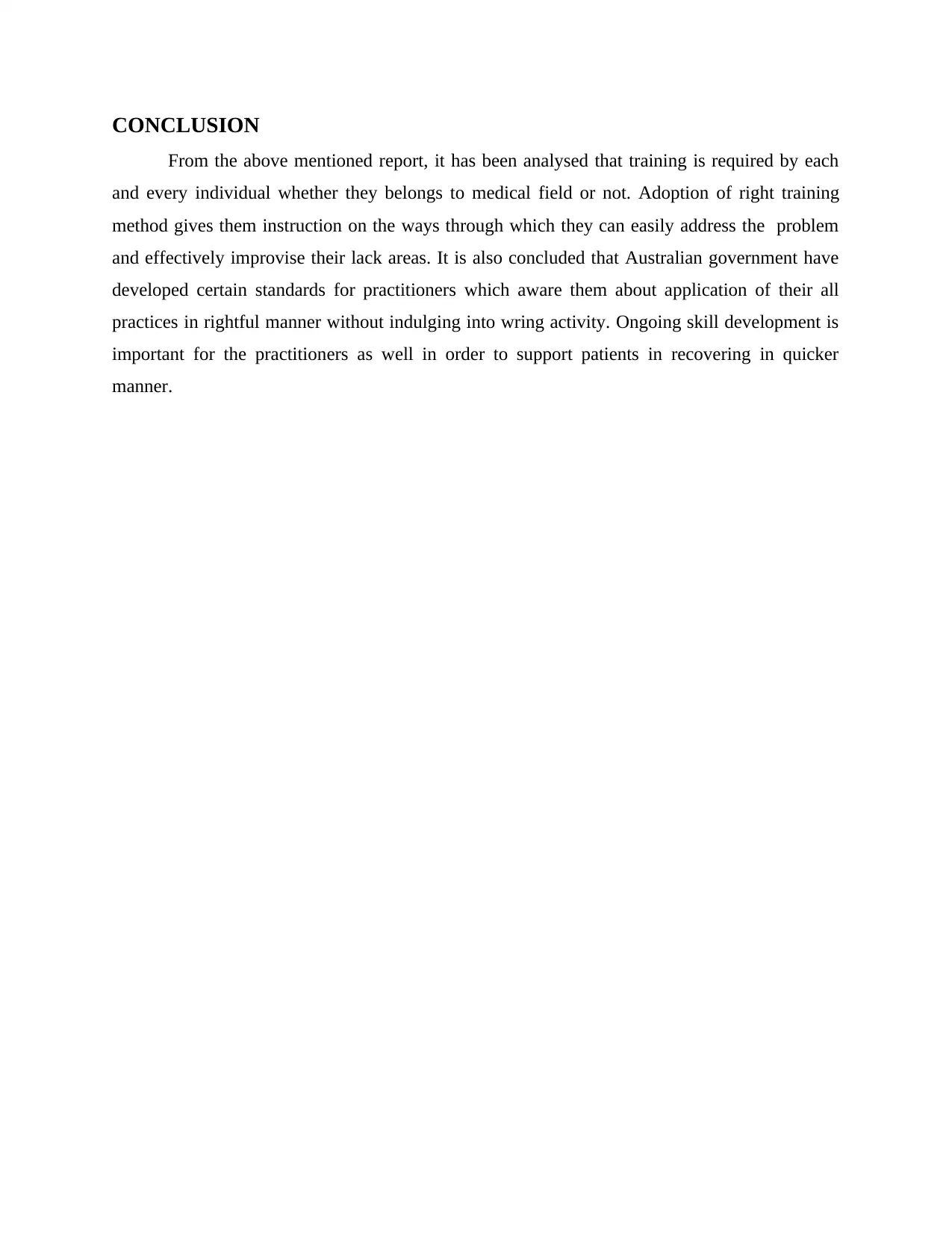
CONCLUSION
From the above mentioned report, it has been analysed that training is required by each
and every individual whether they belongs to medical field or not. Adoption of right training
method gives them instruction on the ways through which they can easily address the problem
and effectively improvise their lack areas. It is also concluded that Australian government have
developed certain standards for practitioners which aware them about application of their all
practices in rightful manner without indulging into wring activity. Ongoing skill development is
important for the practitioners as well in order to support patients in recovering in quicker
manner.
From the above mentioned report, it has been analysed that training is required by each
and every individual whether they belongs to medical field or not. Adoption of right training
method gives them instruction on the ways through which they can easily address the problem
and effectively improvise their lack areas. It is also concluded that Australian government have
developed certain standards for practitioners which aware them about application of their all
practices in rightful manner without indulging into wring activity. Ongoing skill development is
important for the practitioners as well in order to support patients in recovering in quicker
manner.
⊘ This is a preview!⊘
Do you want full access?
Subscribe today to unlock all pages.

Trusted by 1+ million students worldwide
1 out of 14
Related Documents
Your All-in-One AI-Powered Toolkit for Academic Success.
+13062052269
info@desklib.com
Available 24*7 on WhatsApp / Email
![[object Object]](/_next/static/media/star-bottom.7253800d.svg)
Unlock your academic potential
Copyright © 2020–2026 A2Z Services. All Rights Reserved. Developed and managed by ZUCOL.




